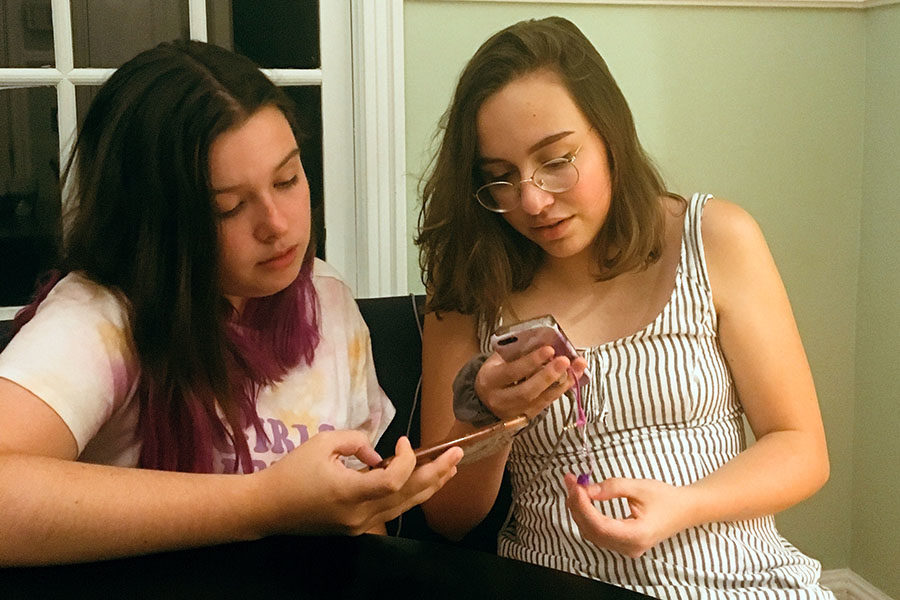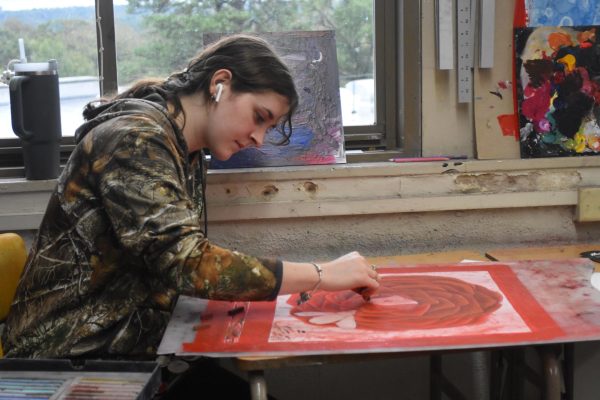Student Deletes Social Media to Quell Bad Habits
Social media is habitual for a lot of people, and it often becomes an unhealthy addiction. It’s hard for users to put their phones down, and remove themselves from the web of people that they connect with. When teens aren’t on social media, they often feel like they’re missing out and not experiencing the trends their friends are. Sophomore Anna Spollen, however, has ditched the trend and is living social media free.
“On social media, there’s always new content. There is never a dull moment. But it’s like empty calories. It’ll give you something quickly to satisfy you, such as likes on a post, but you end up feeling worse,“ Anna said.
Anna was a self-labelled social media addict, and she spent hours almost every day on Instagram and Snapchat. Every time she got bored, she would get on social media, and it became so habitual that she would often get on these apps without even thinking. She realized that being on social media constantly didn’t help her be productive or do things she wanted to do, like be present in conversation with peers. She knew it was time for a change.
“I was going on a three day trip with my mom. I knew on that trip that I wanted to be present and be with other people. So the first day of my trip, I deleted Instagram and Snapchat. I’d planned to re-download it after the trip, but I realized that I felt happier and less tied down to something when I didn’t have them,” Anna said.
It’s not easy for most to stop using social media, as so many fear that they’ll be removed from a world that they’ve become so accustomed to. The fear of missing out applies to many situations, and social media is not an exception.
“I was worried for a while that I was gonna talk to people less and become out of touch with society and what was popular, but I’ve been off of it for almost a month now, and asked people if I’ve missed anything, and nothing life-changing has happened,” Anna said. “I didn’t get off social media for a while because I thought I would become out of touch with people, and it would affect my relationships with them, but it really hasn’t.”
Getting off of social media also has its own benefits. Not only does it help people stop comparing their lives to those of others, it also encourages people to participate in more face-to-face friendships, and to be more present when having conversations with others. When people face this addiction and try to fight it, they allow themselves to think when they’re bored and to have constructive thoughts.
“I’ve been more productive. I spend less time on my phone doing nothing. It’s helped me be more social and be more present in the moment. When people use to come over for dinner, I would leave the room and be on my phone. I used to miss out on meaningful conversations with other people,” Anna said. “You think that when you’re on social media that you’re being social, but you miss a lot of real life moments.”
Anna enjoys living social media free. Although she still maintains a Twitter account, she says she has stopped relying on the approval of others on social media and uses Twitter strictly for entertainment, and not because she wants to compare herself to others. She says that social media has it’s advantages, such as being connected and in touch with your peers, but for her it was a bad habit that she needed to cut out.








Tyra D • Jan 10, 2019 at 1:05 pm
I agree with everything .. I feel like once you get so attached to social media it’s like you can’t stop most people get on things like Instagram and Snapchat as soon as they wake up and i don’t think that’s healthy .
Madison Tucker • Sep 21, 2018 at 2:37 pm
This article almost made me want to delete my social media… almost
Colm S. • Sep 21, 2018 at 12:52 pm
I’ve also gone through a similar metamorphosis. Instagram and Snapchat were just too much. To the point that every time I typed the letter s it autocorrected to streaks. I was over it, so I deleted both accounts and I dont miss them. Cheers to detoxing!
Anna • Sep 21, 2018 at 12:46 pm
Wow I’m really out here being inspirational
Mary Ruth • Sep 14, 2018 at 8:59 am
Anna really out here being inspirational
Hailey Robbins • Sep 14, 2018 at 8:58 am
The article was very well worded and it helped show you can have a life outside of social media. The way students interact is really hard because all they want to do is be on their phones. Right now personally I can prove to people that not having a phone or social media it isn’t that bad but it is a little hard.